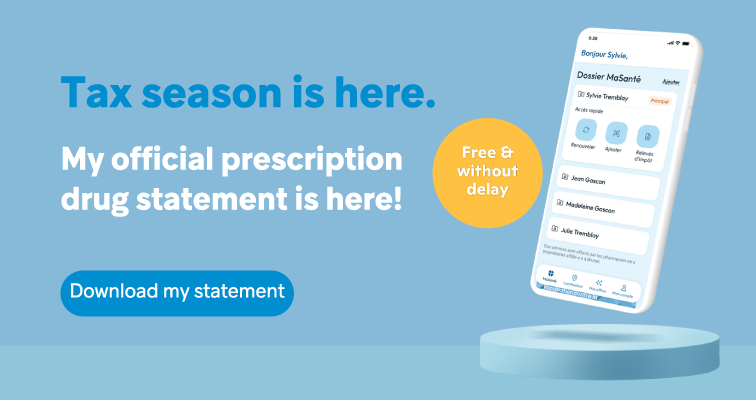Did you know that nearly 80% of new moms experience temporary symptoms of depression around the third day following childbirth? Less often, these symptoms persist and turn into depression. Knowing more about the baby blues and post-partum depression will allow you to better face these conditions.

The baby blues
Pregnancy and childbirth are amazing experiences that lead to many changes; in the first days following childbirth, the mother must adapt to the baby’s arrival and to many other new elements. Around the third day (sometimes before and up to 10 to 14 days after), many women are affected by symptoms suggesting an emotional imbalance, such as:
- mood swings, such as alternating between laughing and crying;
- irritability;
- impatience;
- insomnia;
- feelings of vulnerability or maternal incompetence.
These signs of hypersensitivity are completely normal and are no cause to worry. They are said to be caused by the hormonal changes and fatigue that come after giving birth. The intensity and duration of symptoms vary from one woman to another; they can last only a day, or persist for several. Symptoms usually disappear in less than two weeks.
To ease the baby blues
Tips for mom:
- Talk about your feelings to your partner, family, friend or medical staff.
- Ask for help in caring for yourself or your baby. Get the most help possible.
- Sleep every time you get the chance.
- If having visitors makes you exhausted or causes additional stress, limit their number.
- Enjoy skin-to-skin contact with your baby.
- Be kind and patient with yourself. Don’t aim for perfection.
- Surround yourself with one or several individuals that you trust and with whom you can be yourself. For example, ask your best friend to stay by your side during the most difficult moments.
Tips for partners, family and friends:
- If you feel like you don’t recognize the new mom anymore, don’t worry. The symptoms of baby blues are usually temporary. Take them with a grain of salt.
- Be gentle, patient and comforting.
- Congratulate mom and offer positive reinforcement.
- Don’t tell her what to do and let her live her own experiences.
- Make her laugh. Humour is a great way to put things into perspective.
- Offer her your help and support.
Post-partum depression: a more serious condition
Contrary to the baby blues, which are often mild and temporary, post-partum depression is a more severe medical condition that usually lasts longer. Because it can be harmful to both the mother and child, it must be taken seriously. Between 10 and 20% of women experience significant symptoms in the year following the baby’s birth. Unfortunately, post-partum depression can last several months and sometimes even more than a year. Women who suffer from it may hesitate to ask for help because they are feeling shame, failure or guilt. In addition, some believe, mistakenly, that their symptoms are normal and explained by the fatigue brought on by having to care for a newborn. If you are suffering from post-partum depression, it is important to get properly diagnosed and to begin treatment as soon as possible. Here are a few examples of symptoms that may indicate this condition:
- constantly feeling exhausted or demoralized;
- extreme anxiety;
- trouble sleeping;
- crying all the time;
- self-deprecation or excessive guilt;
- significant changes to appetite;
- loss of interest in usual activities;
- inability to take care of your baby or yourself;
- physical symptoms: headache, numbness, chest pain, hyperventilation, etc.
- irritability or aggressiveness;
- dark or suicidal thoughts.
These symptoms usually appear at least one month after childbirth and during the first year. If you are experiencing one or more of these symptoms, don’t hesitate to see a doctor for your sake and for your baby’s.
Treating post-partum depression
There are several ways to treat post-partum depression. Psychological help, support groups and medication (such as antidepressants) are all good methods that can be suggested to a new mom who is struggling with this illness. A close medical follow-up is not only helpful, but also almost always necessary. If your doctor prescribes a treatment with medication, discuss it with your pharmacist. She or he can listen to you and give you all the information you need on medication, such as its benefits, onset of action, side effects and ways to alleviate them. In addition to medical attention, taking good care of yourself and adopting a healthy lifestyle will also help you get through this difficult time in your life. Here are a few tips:
- Take the time to eat well.
- Don’t neglect your personal care: taking a bath or shower, getting dressed, putting on makeup or doing your hair will help you keep your chin up and feel good about yourself.
- Go out and do things to relax and get your mind off things, with or without your baby.
- Learn to delegate: caring for baby, housecleaning, daily chores, etc.
- Exercise regularly; choose activities that you really enjoy.
- Accept that perfection is impossible.
- Get a massage or learn relaxation techniques.
If you suffer from post-partum depression, don’t be hard on yourself. It is an illness just like any other. Have confidence in yourself and in your ability to find the resources you’ll need to get through it, and ask your loved ones for help. Becoming a parent is an experience that is enriching and fulfilling, but that can also be very difficult for some. Recognizing the symptoms of post-partum depression will allow you to detect it early and find ways to treat it. That way, you’ll finally be able to appreciate the many joys that motherhood has in store for you!
